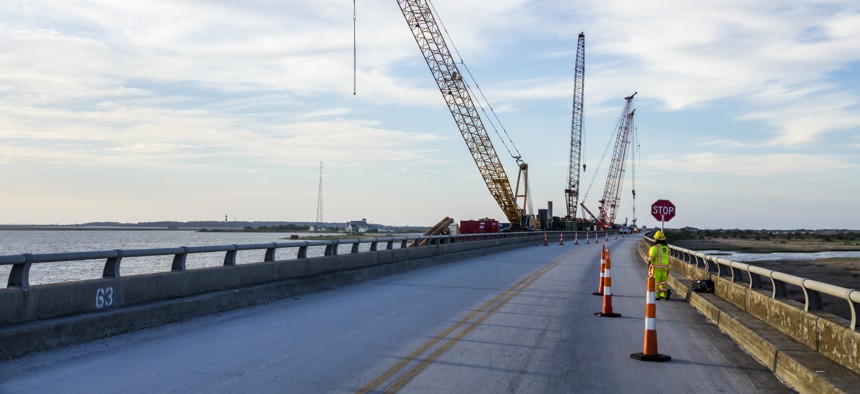$1.5 billion now available in federal transportation grants

North Carolina won 2023 RAISE grants to construct 28 bridges to avoid closures caused by flooding. Jeffrey Greenberg/Universal Images Group via Getty Images
A variety of road, transit, rail and trail projects are eligible for funding under the Transportation Department’s popular RAISE program.
State and local governments could get a slice of up to $1.5 billion to complete critical freight and passenger transportation infrastructure projects, the Biden administration announced Thursday.
The U.S. Department of Transportation issued a notice of funding opportunity for the 2024 Rebuilding American Infrastructure with Sustainability and Equity, or RAISE, program. Earlier this year, it handed out $2.2 billion under the program to 162 major projects across the country.
“Thanks to President Biden’s leadership, we are delivering safer, cleaner infrastructure to communities of every size and in every part of the country, creating a new generation of jobs and helping families build generational wealth in the process,” Transportation Secretary Pete Buttigieg said in a statement.
A variety of road, transit, rail and trail projects are eligible for funding, which will be split evenly between projects in rural and urban areas. RAISE is the latest incarnation of the popular competitive grant program once known as TIGER. Funding for the grants was included in the 2021 bipartisan infrastructure law.
This year, individual projects received up to $25 million in grants to improve connections among different transportation modes, or to improve handling of freight.
The $1.5 billion for the program is down from the $2.2 billion awarded in the previous round. But new this year is that applicants that failed to win grants but were designated “program extra” under the Reconnecting Communities program will have a greater opportunity to advance. The program, which Congress created as part of the 2021 infrastructure law, funds projects that help neighborhoods mitigate some of the damages that infrastructure projects caused to local residents.
Meanwhile, at least $15 million is designated for projects in areas with persistent poverty, or that qualify as historically disadvantaged communities. The infrastructure law also expands the number of places eligible to receive a 100% federal share of funding for their projects, DOT noted. Under the 2023 grants, nearly two-thirds of projects were located in areas of persistent poverty or historically disadvantaged communities.
The department continues to stress that applicants can be more competitive if their projects create jobs that offer a "free and fair choice to join a union," adhere to strong workplace standards, boost employment in underserved communities and support worker training opportunities, especially registered apprenticeships. Four of the projects selected in this year’s round have project labor agreements, eight use registered apprenticeship programs and another eight projects use other workforce development components. Eleven of the 162 projects included a local-hire provision.
The department also urges applicants to consider how their projects can address challenges around climate change and racial inequity.
Applications for the grants are due by Feb. 28 and the department plans to announce grantees by June 27.
The notice of funding opportunity can be found here.





